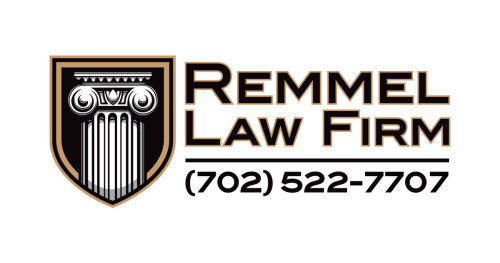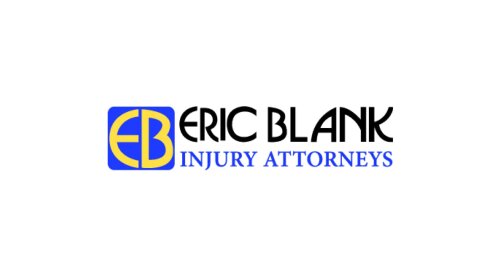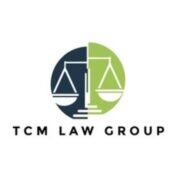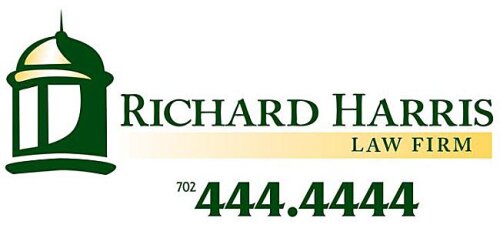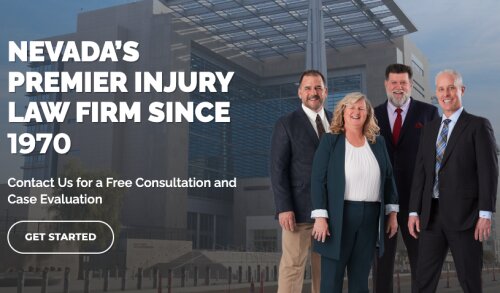Best ADR Mediation & Arbitration Lawyers in Las Vegas
Share your needs with us, get contacted by law firms.
Free. Takes 2 min.
List of the best lawyers in Las Vegas, United States
About ADR Mediation & Arbitration Law in Las Vegas, United States
Alternative dispute resolution - ADR - refers to processes like mediation and arbitration that let people resolve civil disputes outside of a full court trial. In Las Vegas, ADR is widely used for commercial disputes, construction claims, employment matters, consumer and landlord-tenant issues, and many other civil controversies. The procedures that govern mediation and arbitration in Las Vegas are shaped by a mix of federal law, Nevada state law, local court rules, and private provider rules. Courts in Clark County and the District of Nevada often encourage or require ADR at various stages to reduce case backlog and help parties reach faster, less-expensive resolutions.
Why You May Need a Lawyer
Even though mediation and arbitration can be faster and less formal than litigation, legal issues and strategic choices can be complex. You may need a lawyer when:
- The dispute involves significant money damages, complex legal issues, or complicated factual records.
- The other side is represented by counsel, especially experienced counsel or corporate representatives.
- There is a binding arbitration clause in a contract that limits your right to go to court or restricts remedies.
- You need help understanding your rights, legal defenses, or potential remedies under Nevada law or federal law.
- You want an advocate to prepare legal briefs, evidence, and witness examinations for a formal arbitration hearing.
- You need help negotiating or drafting a settlement agreement after mediation to make sure it is enforceable and protects your interests.
- You suspect fraud, bias, procedural misconduct, or other grounds that might justify vacating or modifying an arbitration award.
A lawyer can advise you on strategy, represent you in hearings, prepare and present evidence, draft settlement documents, and handle post-award court proceedings to confirm or vacate an arbitration award.
Local Laws Overview
Key legal features relevant to ADR in Las Vegas include the following:
- Federal Arbitration Act - The Federal Arbitration Act - FAA - applies to many interstate and contract-based arbitration agreements. The FAA generally favors enforcement of arbitration clauses and governs judicial review of arbitration awards in federal court.
- Nevada statutory and court rules - Nevada law includes statutes and court rules that address mediation confidentiality, the conduct of arbitrations, and procedures for confirming or vacating awards in state court. Local courts may publish forms and procedures for ADR participation.
- Court ADR programs - Clark County and the federal District of Nevada provide court-annexed ADR programs, which may include mediation, settlement conferences, and other neutral evaluation processes. Judges often order or refer parties to these programs during case-management.
- Confidentiality - Mediation communications are typically confidential under Nevada rules and statutes, meaning statements made during mediation cannot be used later at trial in most situations. Confidentiality exceptions may apply in cases involving crime, threats, or fraud.
- Binding versus non-binding ADR - Mediation is usually non-binding unless parties sign a settlement agreement. Arbitration can be either binding or non-binding depending on the parties agreement. Binding arbitration awards are enforceable in court, and there are limited grounds to challenge them.
- Consumer and employment clauses - Many consumer and employment contracts contain mandatory arbitration clauses. Federal and state courts scrutinize enforceability in certain circumstances, including unconscionability, waiver, and statutory rights that may not be arbitrable.
- Remedies and discovery - The scope of remedies, discovery, and procedural protections in arbitration may differ from court litigation. Parties can contract for broader or narrower discovery and may select arbitrators with subject-matter expertise.
Frequently Asked Questions
What is the difference between mediation and arbitration?
Mediation is a facilitated negotiation led by a neutral mediator who helps parties explore settlement options. Mediation is normally non-binding unless the parties sign a written settlement agreement. Arbitration is a private adjudication where an arbitrator or panel hears evidence and issues a decision or award. Arbitration can be binding or non-binding depending on the parties agreement, but most commercial arbitrations are binding and enforceable in court.
Are mediation communications confidential in Las Vegas?
Yes, mediation communications are generally confidential under Nevada practice and common ADR rules. That means statements, offers, and drafts exchanged during mediation typically cannot be used as evidence later. Confidentiality has limits - for example, admissions of criminal conduct or evidence outside the mediation that is independently discoverable may not be protected. Always confirm confidentiality rules with the mediator and your lawyer before sharing sensitive information.
Can I be forced into arbitration if my contract has an arbitration clause?
Often yes. If you signed a contract with a valid arbitration clause, a court will usually enforce it and compel arbitration, subject to certain defenses. However, a court may refuse to compel arbitration if the clause is unconscionable, procured by fraud, unclear about scope, or precluded by statute. The Federal Arbitration Act preempts conflicting state rules in many cases, but enforcement depends on the specifics of the contract and the dispute.
Is an arbitration award final? Can I appeal?
Arbitration awards are final in the sense that they are binding and enforceable, but judicial review is very limited. Courts will typically confirm awards and enter judgment unless there are narrow grounds to vacate or modify the award - such as corruption, fraud, evident partiality by the arbitrator, misconduct, or if the arbitrator exceeded their powers. Arbitration awards may be vacated for procedural defects in limited circumstances, but there is no broad appellate review like a regular court appeal.
Do I need a lawyer for mediation?
You do not always need a lawyer to attend mediation, but having counsel is often important when legal issues, significant money, or complex facts are involved. A lawyer can prepare legal positions, protect your rights during negotiation, draft settlement language, and advise on tax or enforcement consequences. If you proceed without a lawyer, consider at least obtaining a consultation beforehand.
How much does arbitration or mediation cost in Las Vegas?
Costs vary widely depending on the provider, the complexity of the dispute, the number of hearing days, and whether the mediation or arbitration is administered or ad hoc. Fees include mediator or arbitrator hourly or daily rates, facility costs, filing or administration fees, and attorney fees. Small mediations can be relatively inexpensive, while complex commercial arbitrations can be costly. Parties often split neutral fees, but fee arrangements should be agreed upon in advance.
What should I bring to a mediation session?
Bring a concise summary of your position, key documents, any relevant contracts, a list of witnesses or witnesses statements if needed, and a clear idea of your objectives and bottom line. Prepare an opening statement or a mediation brief if requested by the mediator. Also bring any recent correspondence that frames the current state of settlement talks. Discuss strategy with your lawyer before the session.
How do I enforce an arbitration award in Nevada?
To enforce a binding arbitration award, you typically file a petition or motion to confirm the award in the appropriate state or federal court and then obtain a judgment based on the confirmed award. Once confirmed, the judgment can be enforced like any other court judgment through garnishment, liens, or levy procedures. If the other side resists, you may need counsel to prosecute the confirmation and enforcement action.
What grounds exist to challenge or vacate an arbitration award?
Available grounds are narrow and fact-specific. Common bases for vacatur include corruption or fraud by the arbitrator, evident partiality, misconduct that prejudiced a party, the arbitrator exceeding the scope of authority, or a procedural defect preventing a fair hearing. Contractual limits and the FAA can restrict judicial intervention, so challenges should be evaluated promptly with experienced counsel.
How do I pick the right mediator or arbitrator in Las Vegas?
Choose a neutral based on relevant experience, subject-matter expertise, reputation for fairness, and procedural approach. For technical disputes, select an arbitrator with industry knowledge. Check whether the neutral is on a provider panel, their availability, fee structure, and whether they require pre-hearing briefs or have specific procedural preferences. Consider whether the neutral’s style is evaluative, facilitative, or judicial and pick someone who fits the dynamics of your case.
Additional Resources
Helpful organizations and authorities to consult include:
- Nevada State Bar - for lawyer referrals, ethics guidance, and public resources on dispute resolution.
- Clark County Bar Association - local lawyer directory and local ADR initiatives.
- Eighth Judicial District Court - local court-annexed ADR programs and court rules applicable in Las Vegas and Clark County.
- United States District Court for the District of Nevada - federal ADR rules and court referrals.
- Private ADR providers - such as national or regional arbitration and mediation organizations that administer cases and provide rosters of neutrals.
- Consumer protection and regulatory agencies - for disputes involving licensed professionals, businesses, or regulated industries.
- Local law libraries and self-help centers - for forms and plain-language explanations of procedures.
Next Steps
If you need legal assistance with mediation or arbitration in Las Vegas, consider the following practical steps:
- Assess the dispute - Gather contracts, correspondence, invoices, and any evidence that frames your position. Identify deadlines and statutes of limitation.
- Get an initial consultation - Contact an attorney with ADR experience to review your case, explain options, and outline potential costs. Ask about their mediation and arbitration experience and success rate.
- Decide on goals and budget - Clarify what you want to achieve, what settlement range you will accept, and how much you can spend on counsel and neutral fees.
- Review your contract - If there is an arbitration clause, have a lawyer review its scope, selection procedures for neutrals, and any limits on remedies or appeals.
- Select neutrals carefully - If the contract allows you to choose, pick mediators or arbitrators with relevant experience and a suitable approach for your dispute.
- Prepare strategically - Work with your lawyer to prepare briefs, exhibits, witness outlines, and negotiation lines for mediation or a hearing plan for arbitration.
- Protect the result - If you reach a settlement, have an attorney draft a clear written agreement and obtain court approval if necessary. If you receive an arbitration award, consult counsel about confirmation and enforcement in court.
ADR can be an efficient and effective path to resolution, but successful outcomes often depend on preparation, strategy, and picking the right counsel and neutral. If you are unsure how to proceed, start with a legal consultation focused on ADR experience in Las Vegas and Nevada law.
Lawzana helps you find the best lawyers and law firms in Las Vegas through a curated and pre-screened list of qualified legal professionals. Our platform offers rankings and detailed profiles of attorneys and law firms, allowing you to compare based on practice areas, including ADR Mediation & Arbitration , experience, and client feedback.
Each profile includes a description of the firm's areas of practice, client reviews, team members and partners, year of establishment, spoken languages, office locations, contact information, social media presence, and any published articles or resources. Most firms on our platform speak English and are experienced in both local and international legal matters.
Get a quote from top-rated law firms in Las Vegas, United States — quickly, securely, and without unnecessary hassle.
Disclaimer:
The information provided on this page is for general informational purposes only and does not constitute legal advice. While we strive to ensure the accuracy and relevance of the content, legal information may change over time, and interpretations of the law can vary. You should always consult with a qualified legal professional for advice specific to your situation.
We disclaim all liability for actions taken or not taken based on the content of this page. If you believe any information is incorrect or outdated, please contact us, and we will review and update it where appropriate.



